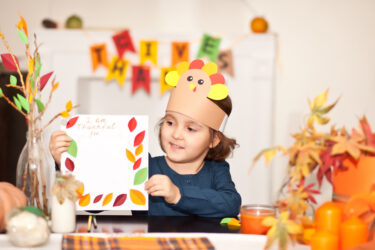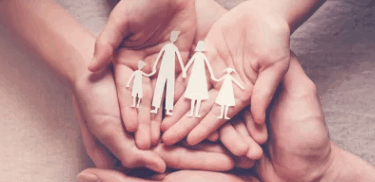
Picture this: 5-year-old Sarah is sitting in the grocery cart, next to her little brother. When she reaches over and pulls her brother’s hair, her mom responds by slapping her hand and telling her in a voice loud enough for all to hear, “Stop that right now, or you’re going to go out and sit in the van by yourself!”
Sarah stops, her mother turns around, and the little girl sticks her tongue out at her brother, prompting loud wails of protest. Or this: Jon’s father is having a conversation with an old friend in the lobby of the movie theater. Sixteen-year-old Jon, with earphones in his ears, steps into the middle of the conversation, grabs his father’s car keys and tells him, “Come on, I gotta get home.” The dad apologizes profusely, and leaves the conversation and his friend in mid-sentence.
Finally, there is 8-year-old Jennifer, who is in her backyard, playing with some friends in the wading pool. Someone splashes water in her face, and Jennifer stands and cries loudly for a towel. She could get the towel herself, but she knows that if she cries loudly enough for the neighbors to hear that Mom will stop what she is doing to go and get her a towel.
We’ve all witnessed scenes like this. The difficult part is, many of us can see ourselves in similar situations. Our teenagers become indignant and rude if we don’t drive them to the mall immediately, our school-age children yell and stomp off when they are not allowed to watch TV, and sometimes we are shocked to see one sibling strike another in the heat of an argument. This lack of respect perplexes, hurts and angers us. And what’s more, in the long run this rude behavior has even deeper, more harmful consequences.
In their book, Raising Respectful Kids in a Rude World: Teaching Your Children the Power of Mutual Respect and Consideration, (Prima Publishing, $18), authors Gary D. McKay, Joyce L. McKay, Daniel Eckstein and Steven Maybell, suggest that mutual respect is the foundation for all effective human relationships. “It is perhaps the most essential value we can teach children,” they write.
Imagine Jennifer, the little girl who demanded a towel be given her immediately. How will she be able to function in a mutually satisfying relationship when she is an adult? How about Sarah who has learned to get what she wants by physically hurting others? And then there’s Jon, who blatantly ignores others’ conversations. Unless he is taught respectful behavior, how will he function in a work setting? These scenarios reinforce the importance of parents teaching their child respectful behavior.
What does respectful behavior look like? According to McKay, McKay, Eckstein and Maybell, “Respectful kids accept responsibility. They learn to be encouraging. These kids possess healthy self-esteem and esteem for others. They learn empathy for others and are more cooperative and thoughtful.”
Sounds good, but how do we teach respect? The authors say,”If we wish to have more respectful kids, we need to become more respectful parents.” On the flip side, “When we communicate with disrespect, our children don’t respect us and rudeness begets rudeness.”
The Disrespectful Parent
Most of us are trying to think of a time we were EVER rude to our children. The common thought is, “I treat my children with the utmost respect. Then I turn around and they’re talking back, or interrupting me on the phone, or turning on the TV set when I just told them not to.” But you might be surprised to find out that disrespect comes in many forms. In fact, the authors suggest that there are three “Disrespectful Parenting Roles.”
- The Boss – This is the parent who gives orders. These parents are autocratic and focus on controlling their children. They tell their kids what to do, reward them if they do it and punish them if they don’t. This parent shows disrespect in the form of yelling, threatening, hitting or manipulation. Children raised with this model of disrespect learn to be dependent on others telling them what to do. Their behavior is ruled by avoiding punishment and pleasing the boss. Sarah’s mother is a “boss.” By threatening, yelling and hitting, she shows disrespect to her daughter. When Sarah experiences a lack of respect, she turns around and demonstrates that same rude behavior to her brother.
- The Doormat – This is the parent who lets the child rule the roost by setting few or no limits. These children learn to do as they please. This type of parenting is disrespectful because the children do not learn responsibility and respect for others. Jon’s dad is a good example of a doormat. His son learns that only his own feelings matter and that showing respect toward another person is not necessary in order to get what he wants.
- The Servant – This is the parent who pampers the child by providing special service. This disrespectful parenting style discourages the child’s belief in himself. Furthermore, these children become extremely disappointed when they discover that the rest of the world will not be providing special service. Jennifer’s mother is an example of a servant. She shows disrespect to Jennifer by letting her know that she is helpless and that she can only get what she wants by screaming.
The Respectful Parent
Do any of the aforementioned roles ring a bell? Fear not. It’s not too late to let go of a harmful parenting role and adopt a new one. McKay, McKay, Eckstein and Maybell provide two examples of respectful parenting roles that work together to provide positive models of respect:
- The Leader – Leaders give choices. The choices are given within limits of age and development and limits of a particular situation. Giving choices and letting children learn from the consequences of their choices helps kids learn responsibility for themselves and others. An example: “I need to make a phone call, and the game you are playing is too noisy. Can you and your friend please take your game somewhere else, or perhaps find something else to play?”
- The Encourager – The encourager accepts children as they are in spite of unacceptable behaviors. Encouragers do not accept misbehavior, but they do accept the child as a worthwhile human being. They are interested in building their children’s self-esteem and are quick to “catch the child being good.” A simple example: “I appreciate you helping your brother with that math problem.”
Many parents long to let go of old, disrespectful ways, and adopt new, more respectful ones. Respect must be given in order to receive it. And in a respectful environment, you’ll feel happier in relationships with your kids, and you’ll be placing them on a path toward forming healthy relationships built on mutual respect.
Martha Wegner is a mother and freelance writer.




